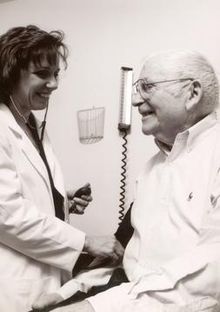- Patient
-
For the state of being, see Patience. For other uses, see Patient (disambiguation).
A patient is any recipient of healthcare services. The patient is most often ill or injured and in need of treatment by a physician, advanced practice registered nurse, veterinarian, or other health care provider.
The word patient originally meant 'one who suffers'. This English noun comes from the Latin word patiens, the present participle of the deponent verb, patior, meaning 'I am suffering,' and akin to the Greek verb πάσχειν (= paskhein, to suffer) and its cognate noun πάθος (= pathos).
Contents
Outpatients and inpatients
An outpatient (or out-patient) is a patient who is not hospitalized for 24 hours or more but who visits a hospital, clinic, or associated facility for diagnosis or treatment. Treatment provided in this fashion is called ambulatory care. Outpatient surgery eliminates inpatient hospital admission, reduces the amount of medication prescribed, and uses the physician's time more efficiently. More procedures are now being performed in a surgeon's office, termed office-based surgery, rather than in a hospital-based operating room. Outpatient surgery is suited best for healthy patients undergoing minor or intermediate procedures (limited urologic, ophthalmologic, or ear, nose, and throat procedures and procedures involving the extremities).
An inpatient (or in-patient), on the other hand, is "admitted" to the hospital and stays overnight or for an indeterminate time, usually several days or weeks (though some cases, like coma patients, have been in hospitals for years). Treatment provided in this fashion is called inpatient care. The admission to the hospital involves the production of an admission note. The leaving of the hospital is officially termed discharge, and involves a corresponding discharge note.
Misdiagnosis is the leading cause of medical error in outpatient facilities. Ever since the National Institute of Medicine’s groundbreaking 1999 report, “To Err is Human,” found up to 98,000 hospital patients die from preventable medical errors in the U.S. each year, government and private sector efforts have focused on inpatient safety.[1] While patient safety efforts have focused on inpatient hospital settings for more than a decade, medical errors are even more likely to happen in a doctor’s office or outpatient clinic or center.
Alternative terminology
Due to concerns such as dignity, human rights and political correctness, the term "patient" is not always used to refer to a person receiving health care. Other terms that are sometimes used include health consumer, health care consumer or client; however, such terminology may be offensive to those receiving public health care as it implies a non-existent business relationship (in at least some countries, it is illegal to practice business within any public hospital). In veterinary medicine, the client is the owner or guardian of the patient. These may be used by governmental agencies, insurance companies, patient groups, or health care facilities. Individuals who use or have used psychiatric services may alternatively refer to themselves as consumers, users, or survivors.
In nursing homes and assisted living facilities, the term resident is generally used in lieu of patient,[2] but it is not uncommon for staff members at such a facility to use the term patient in reference to residents. Similarly, those receiving home health care are called clients.
Patient satisfaction
Patients' satisfaction with an encounter with health care service is mainly dependent on the duration and efficiency of care, and how empathetic and communicable the health care providers are.[3] It is favored by a good doctor-patient relationship. Also, patients that are well informed of the necessary procedures in a clinical encounter, and the time it is expected to take, are generally more satisfied even if there is a longer waiting time.[3]
See also
References
- ^ Janet, Howard. "Malpractice Lawsuits Shed Light on Ailing Outpatient System". My Advocates. http://myadvocatesblog.com/malpractice/malpractice-lawsuits-shed-light-on-ailing-outpatient-system. Retrieved 28 June 2011.
- ^ Foundations of Caregiving, published by the American Red Cross
- ^ a b Simple Tips to Improve Patient Satisfaction By Michael Pulia. American Academy of Emergency Medicine. 2011;18(1):18-19.
External links
- Jadad AR, Rizo CA, Enkin MW (June 2003). "I am a good patient, believe it or not". BMJ 326 (7402): 1293–5. doi:10.1136/bmj.326.7402.1293. PMC 1126181. PMID 12805157. http://www.pubmedcentral.nih.gov/articlerender.fcgi?tool=pmcentrez&artid=1126181.
a peer-reviewed article published in the British Medical Journal's (BMJ) first issue dedicated to patients in its 160 year history - Sokol DK (21 February 2004). "How (not) to be a good patient"]. BMJ 328 (7437): 471. doi:10.1136/bmj.328.7437.471. http://bmj.bmjjournals.com/cgi/content/full/328/7437/471.
review article with views on the meaning of the words "good doctor" vs. "good patient" - Mary Shomons respone to the Time Magazine article "When the Patient is a Googler"
Categories:- Medical terms
- Nursing
Wikimedia Foundation. 2010.

